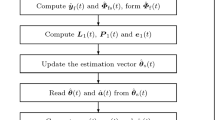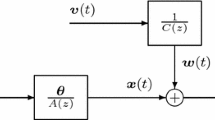Abstract
This paper derives a data filtering-based two-stage stochastic gradient algorithm and a data filtering-based multistage recursive least-squares algorithm for input nonlinear output-error autoregressive systems (i.e., Hammerstein systems). The output of the system is expressed as a linear combination of all system parameters based on the key term separation technique. The basic idea of the proposed algorithm is to filter the input–output data and to separate the parameter vector into several vectors and to interactively identify each parameter vector. The data filtering-based two-stage stochastic gradient algorithm has higher convergence rate than the stochastic gradient algorithm. Compared with the recursive generalized least-squares algorithm, the dimensions of the involved covariance matrices in the data filtering-based multistage recursive least-squares algorithm become small, and thus the data filtering-based multistage recursive least-squares algorithm has a higher computational efficiency. The numerical simulation results indicate that the proposed algorithms are effective.








Similar content being viewed by others
References
E.W. Bai, An optimal two-stage identification algorithm for Hammerstein–Wiener nonlinear systems. Automatica 34(3), 333–338 (1998)
E.W. Bai, A blind approach to the Hammerstein–Wiener model identification. Automatica 38(6), 967–979 (2002)
H.B. Chen, F. Ding, Hierarchical least squares identification for Hammerstein nonlinear controlled autoregressive systems. Circuits Syst. Signal Process. 34(1), 61–75 (2015)
Y.N. Cao, Z.Q. Liu, Signal frequency and parameter estimation for power systems using the hierarchical dentification principle. Math. Comput. Model. 51(5–6), 854–861 (2010)
X. Cao, D.Q. Zhu, S.X. Yang, Multi-AUV target search based on bioinspired neurodynamics model in 3-D underwater environments. IEEE Trans. Neural Netw. Learn. Syst. (2016). doi:10.1109/TNNLS.2015.2482501
H.B. Chen, Y.S. Xiao, F. Ding, Hierarchical gradient parameter estimation algorithm for Hammerstein nonlinear systems using the key term separation principle. Appl. Math. Comput. 247, 1202–1210 (2014)
Z.Z. Chu, D.Q. Zhu, S.X. Yang, Observer-based adaptive neural network trajectory tracking control for remotely operated Vehicle. IEEE Trans. Neural Netw. Learn. Syst. (2016). doi:10.1109/TNNLS.2016.2544786
F. Ding, K.P. Deng, X.M. Liu, Decomposition based Newton iterative identification method for a Hammerstein nonlinear FIR system with ARMA noise. Circuits Syst. Signal Process. 33(9), 2881–2893 (2014)
J. Ding, C.X. Fan, J.X. Lin, Auxiliary model based parameter estimation for dual-rate output error systems with colored noise. Appl. Math. Model. 37(6), 4051–4058 (2013)
J. Ding, J.X. Lin, Modified subspace identification for periodically non-uniformly sampled systems by using the lifting technique. Circuits Syst. Signal Process. 33(5), 1439–1449 (2014)
F. Ding, X.M. Liu, Y. Gu, An auxiliary model based least squares algorithm for a dual-rate state space system with time-delay using the data filtering. J. Franklin Inst. 353(2), 398–408 (2016)
F. Ding, X.H. Wang, Q.J. Chen, Y.S. Xiao, Recursive least squares parameter estimation for a class of output nonlinear systems based on the model decomposition. Circuits Syst. Signal Process. (2016). doi:10.1007/s00034-015-0190-6
V.Z. Filipovic, Consistency of the robust recursive Hammerstein model identification algorithm. J. Franklin Inst. 352(5), 1932–1945 (2015)
L. Fang, J.D. Wang, Q.H. Zhang, Identification of extended Hammerstein systems with hysteresis-type input nonlinearities described by Preisach model. Nonlinear Dyn. 79(2), 1257–1273 (2015)
F. Giri, E.W. Bai, Block-oriented Nonlinear System Identification, Lecture Notes in Control and Information Sciences, vol. 404 (Springer-Verlag, Berlin, 2010)
S. Gibson, B. Ninness, Robust maximum-likelihood estimation of multivariable dynamic systems. Automatica 41(10), 1667–1682 (2005)
Y.B. Hu, B.L. Liu, Q. Zhou, C. Yang, Recursive extended least squares parameter estimation for Wiener nonlinear systems with moving average noises. Circuits Syst. Signal Process. 33(2), 655–664 (2014)
Y. Ji, X.M. Liu, F. Ding, New criteria for the robust impulsive synchronization of uncertain chaotic delayed nonlinear systems. Nonlinear Dyn. 79(1), 1–9 (2015)
Y. Ji, X.M. Liu, Unified synchronization criteria for hybrid switching-impulsive dynamical networks. Circuits Syst. Signal Process. 34(5), 1499–1517 (2015)
H. Khodadadi, H. Jazayeri-Rad, Applying a dual extended Kalman filter for the nonlinear state and parameter estimations of a continuous stirred tank reactor. Comput. Chem. Eng. 35(11), 2426–2436 (2011)
H. Karimi, K.B. McAuley, A maximum-likelihood method for estimating parameters, stochastic disturbance intensities and measurement noise variances in nonlinear dynamic models with process disturbances. Comput. Chem. Eng. 67, 178–198 (2014)
J.H. Li, Parameter estimation for Hammerstein CARARMA systems based on the Newton iteration. Appl. Math. Lett. 26(1), 91–96 (2013)
X.G. Liu, J. Lu, Least squares based iterative identification for a class of multirate systems. Automatica 46(3), 549–554 (2010)
S. Mousazadeh, M. Karimi, Estimating multivariate ARCH parameters by two-stage least-squares method. Signal Process. 89(5), 921–932 (2009)
M. Matinfar, M. Saeidy, B. Gharahsuflu, M. Eslami, Solutions of nonlinear chemistry problems by homotopy analysis. Comput. Math. Model. 25(1), 103–114 (2014)
J. Prakash, B. Huang, S.L. Shah, Recursive constrained state estimation using modified extended Kalman filter. Comput. Chem. Eng. 65, 9–17 (2014)
J. Paduart, L. Lauwers, R. Pintelon, J. Schoukens, Identification of a Wiener–Hammerstein system using the polynomial nonlinear state space approach. Control Eng. Pract. 20(11), 1133–1139 (2012)
A. Savran, Discrete state space modeling and control of nonlinear unknown systems. ISA Trans. 52(6), 795–806 (2013)
Y. Shi, H. Fang, Kalman filter based identification for systems with randomly missing measurements in a network environment. Int. J. Control 83(3), 538–551 (2010)
T. Söderström, M. Hong, J. Schoukens, R. Pintelon, Accuracy analysis of time domain maximum likelihood method and sample maximum likelihood method for errors-in-variables and output error identification. Automatica 46(4), 721–727 (2010)
J. Vörös, Modeling and parameter identification of systems with multi-segment piecewise-linear characteristics. IEEE Trans. Automat. Control 47(1), 184–188 (2002)
J. Vörös, Recursive identification of Hammerstein systems with discontinuous nonlinearities containing dead-zones. IEEE Trans. Automat. Control 48(12), 2203–2206 (2003)
L. Vanbeylen, R. Pintelon, J. Schoukens, Blind maximum likelihood identification of Hammerstein systems. Automatica 44(12), 3139–3146 (2008)
D.Q. Wang, Least squares-based recursive and iterative estimation for output error moving average systems using data filtering. IET Control Theory Appl. 5(14), 1648–1657 (2011)
D.Q. Wang, Hierarchical parameter estimation for a class of MIMO Hammerstein systems based on the reframed models. Appl. Math. Lett. 57, 13–19 (2016)
D.W. Wang, F. Ding, Parameter estimation algorithms for multivariable Hammerstein CARMA systems. Inf. Sci. 355, 237–248 (2016)
Y.J. Wang, F. Ding, Novel data filtering based parameter identification for multiple-input multiple-output systems using the auxiliary model. Automatica (2016). doi:10.1016/j.automatica.2016.05.024
Y.J. Wang, F. Ding, Recursive parameter estimation algorithms and convergence for a class of nonlinear systems with colored noise. Circuits Syst. Signal Process. (2016). doi:10.1007/s00034-015-0210-6
Y.J. Wang, F. Ding, Recursive least squares algorithm and gradient algorithm for Hammerstein–Wiener systems using the data filtering. Nonlinear Dyn. 84(2), 1045–1053 (2016)
Y.J. Wang, F. Ding, Iterative estimation for a nonlinear IIR filter with moving average noise by means of the data filtering technique. IMA J. Math. Control Inf. (2016). doi:10.1093/imamci/dnv067
Y.J. Wang, F. Ding, The filtering based iterative identification for multivariable systems. IET Control Theory Appl. 10(8), 894–902 (2016)
Y.J. Wang, F. Ding, The auxiliary model based hierarchical gradient algorithms and convergence analysis using the filtering technique. Signal Process. 128, 212–221 (2016)
X.H. Wang, F. Ding, Convergence of the recursive identification algorithms for multivariate pseudo-linear regressive systems. Int. J. Adapt. Control Signal Process. (2016). doi:10.1002/acs.2642
C. Wang, T. Tang, Several gradient-based iterative estimation algorithms for a class of nonlinear systems using the filtering technique. Nonlinear Dynam. 77(3), 769–780 (2014)
J. Wang, Q. Zhang, Detection of asymmetric control valve stiction from oscillatory data using an extended Hammerstein system identification method. J. Process Control 24(1), 1–12 (2014)
D.Q. Wang, W. Zhang, Improved least squares identification algorithm for multivariable Hammerstein systems. J. Franklin Inst. 352(11), 5292–5370 (2015)
W.G. Zhang, Decomposition based least squares iterative estimation for output error moving average systems. Eng. Comput. 31(4), 709–725 (2014)
H. Zhang, Y. Shi, A.S. Mehr, Robust H-infty PID control for multivariable networked control systems with disturbance/noise attenuation. Int. J. Robust Nonlinear Control 22(2), 183–204 (2012)
Z.G. Zhao, B. Huang, F. Liu, Parameter estimation in batch process using EM algorithm with particle filter. Comput. Chem. Eng. 57, 159–172 (2013)
Acknowledgments
This work was supported by the Fundamental Research Funds for the Central Universities (No. JUSRP1509XNC) and the National Natural Science Foundation of China (No. 21206053).
Author information
Authors and Affiliations
Corresponding author
Rights and permissions
About this article
Cite this article
Ma, J., Ding, F. Filtering-Based Multistage Recursive Identification Algorithm for an Input Nonlinear Output-Error Autoregressive System by Using the Key Term Separation Technique. Circuits Syst Signal Process 36, 577–599 (2017). https://doi.org/10.1007/s00034-016-0333-4
Received:
Revised:
Accepted:
Published:
Issue Date:
DOI: https://doi.org/10.1007/s00034-016-0333-4




